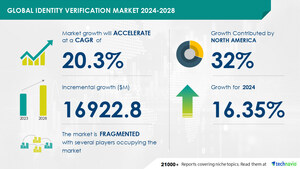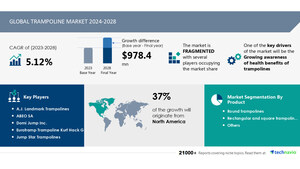NEW YORK, Nov. 11, 2024 /PRNewswire/ -- Report on how AI is redefining market landscape - The global robotic process automation (RPA) market size is estimated to grow by USD 37.6 billion from 2024-2028, according to Technavio. The market is estimated to grow at a CAGR of over 48.07% during the forecast period. Improved cost savings for businesses is driving market growth, with a trend towards emerging trends in business process transformation. However, subscription cost of rpa software poses a challenge.Key market players include Accenture Plc, Advanced Systems Concepts Inc., Amelia US LLC, Atos SE, Automation Anywhere Inc., Cognizant Technology Solutions Corp., Deloitte Touche Tohmatsu Ltd., Genpact Ltd., Infosys Ltd., International Business Machines Corp., Kofax Inc., Microsoft Corp., NICE Ltd., Nintex Ltd., Nippon Telegraph and Telephone Corp., OnviSource Inc., Pegasystems Inc., SS and C Technologies Holdings Inc., UiPath Inc., and WorkFusion Inc..
Key insights into market evolution with AI-powered analysis. Explore trends, segmentation, and growth drivers- View Free Sample PDF
Robotic Process Automation (Rpa) Market Scope |
|
Report Coverage |
Details |
Base year |
2023 |
Historic period |
2018 - 2022 |
Forecast period |
2024-2028 |
Growth momentum & CAGR |
Accelerate at a CAGR of 48.07% |
Market growth 2024-2028 |
USD 37603.1 million |
Market structure |
Fragmented |
YoY growth 2022-2023 (%) |
37.47 |
Regional analysis |
North America, Europe, APAC, South America, |
Performing market contribution |
North America at 38% |
Key countries |
US, UK, China, Germany, and Japan |
Key companies profiled |
Accenture Plc, Advanced Systems Concepts |
Market Driver
In today's digital transformation era, Robotic Process Automation (RPA) is a trending business solution that utilizes software robots to automate repetitive tasks. IQ bots and intelligent bots are the latest RPA innovations, offering bot insights for improved digital workplace efficiency. Robotic operating models, such as Blue Prism Cloud, enable machine learning and cognitive technologies for rule-based and knowledge-based automation. Industries like healthcare providers, contact centers, vaccine manufacturers, and the pharmaceutical sector are adopting RPA for pharmacovigilance, data manipulation, and administration and reporting. The services segment, including RPA Labs and RPA Engage, provides dependable infrastructure and skilled staff for RPA solutions. RPA is transforming IT and telecom, healthcare, hospitality, and various end-user industries. Cognitive robotic process automation, artificial intelligence, and cloud computing are driving automation lifecycle management, workload management, and SLA-based automation. SMEs and SMBs are also embracing cloud-based solutions like PaaS services for customer relationship management, data security, and regulatory compliance. The automotive OEMs, insurance industry, and government organizations are also using RPA for data APIs, network connectivity, and communication. RPA adoption offers significant Return on Investment (ROI) through increased productivity, improved accuracy, and reduced operational costs. In the current business environment, RPA is essential for managing temporary, seasonal workers and handling regulatory spikes in various industries. RPA is revolutionizing industries like finance, accounting and finance, and ERP management, while consumer behavior analysis is transforming the retail sector. Emerging industries like ecommerce and the Census Bureau are also benefiting from RPA solutions. Pioneering companies like Zebra Technologies and Vistage are leading the way in RPA innovation, with conversational RPA chatbots and automation for social distancing norms. Regulated authorities and private companies are using RPA for data security and compliance. RPA is transforming the business landscape, with automotive OEMs, Association for Advancing Automation, and other industry leaders driving the trend. The future of RPA is bright, with continued innovation and growth in this exciting field.
Businesses today prioritize client-centric processes over mere productivity and profit generation. To minimize human errors, which often stem from judgment-based decisions, industries are turning to Robotic Process Automation (RPA) solutions. RPA enhances business operations by increasing their depth and quality. It streamlines interconnected processes within and outside organizations, reducing the likelihood of errors. This focus on quality is a significant trend in modern business practices. By automating repetitive tasks, RPA allows employees to focus on more complex and creative tasks, ultimately improving overall business efficiency.
Request Sample of our comprehensive report now to stay ahead in the AI-driven market evolution!
Market Challenges
- In today's digital transformation era, Robotic Process Automation (RPA) is revolutionizing business operations by automating repetitive tasks. However, implementing RPA comes with challenges. IQ bots require bot insights for optimal performance, and digital workplaces need robotic operating models for seamless integration. Cloud solutions like Blue Prism Cloud and machine learning offer dependable infrastructure and skilled staff. Healthcare providers, contact centers, and vaccine manufacturers in the pharmaceutical sector are major adopters, automating tasks in pharmacovigilance and data manipulation. RPA solutions cater to various industries, including IT and telecom, healthcare, hospitality, and the cognitive robotic process automation market. Challenges include rule-based and knowledge-based automation, capture extraction, administration and reporting, customer support, and communication. Industries like finance, insurance, and the energy sector require SLAs and credential management. Cloud-based solutions offer workload management, automation lifecycle management, and data APIs for SMEs and SMBs. RPA adoption offers significant Return on Investment (ROI) through increased productivity. However, regulatory spikes and temporary or seasonal worker needs may require conversational RPA chatbots and network connectivity. RPA innovators and pioneers include Vistage, Citrix automation, and Zebra Technologies. Regulated authorities, government organizations, and private companies are embracing robot use in automotive OEMs, ecommerce industry, and even the Census Bureau. The RPA market continues to grow, with emerging industries like retail automation and warehouses adopting this technology.
- Businesses are adopting Robotic Process Automation (RPA) software to streamline operations, reduce manual errors, and optimize costs. The cost of implementing RPA involves a quote from third-party vendors, which includes software updates and maintenance. Pricing models vary based on employee hiring and revenue generation strategies. Regulatory terms and conditions between the end-user and software provider can impact the subscription cost or design and development expenses. It is essential to carefully consider these factors before entering into a contract.
Discover how AI is revolutionizing market trends- Get your access now!
This robotic process automation (rpa) market report extensively covers market segmentation by
- Type
- 1.1 Services
- 1.2 Software
- End-user
- 2.1 BFSI
- 2.2 IT/ITES
- 2.3 Telecom
- 2.4 Logistics
- 2.5 Others
- Geography
- 3.1 North America
- 3.2 Europe
- 3.3 APAC
- 3.4 South America
- 3.5 Middle East and Africa
1.1 Services- The global Robotic Process Automation (RPA) market's services segment includes consulting, implementing, and training offerings. Intense competition among RPA providers necessitates enhancing consulting, training, and advisory services. Scalable automation solutions that minimize costs have fueled RPA's demand. RPA-as-a-Service enables businesses to identify automation opportunities, create business cases, and select vendors for pilot projects. For instance, NITCO Inc. Offers RPA-managed services, including IT workload support and maintenance. These factors are expected to drive the services segment's growth in the global RPA market during the forecast period.
Download a Sample of our comprehensive report today to discover how AI-driven innovations are reshaping competitive dynamics
Research Analysis
Robotic Process Automation (RPA) is a technology that allows businesses to automate repetitive and rule-based tasks using software robots or 'IQ bots'. These bots mimic human actions in a digital workplace, executing tasks with high accuracy and efficiency. RPA is revolutionizing industries such as Healthcare, Hospitality, and the Pharmaceutical sector, where it's being used to automate tasks in healthcare providers, contact centers, vaccine manufacturing, and pharmacovigilance. RPA is a key driver of digital transformation in the era of Artificial Intelligence and Machine Learning. It's being adopted in various industries, including the Energy sector, Aerospace market, Insurance industry, and even Smartphone manufacturing, to enhance productivity and streamline operations. RPA solutions offer cloud models to cater to industry-specific needs, enabling data manipulation and ensuring data security. With the rise of intelligent bots, RPA is set to redefine business processes and create new opportunities.
Market Research Overview
In the digital transformation era, Robotic Process Automation (RPA) is revolutionizing business operations by automating repetitive tasks using software robots. IQ bots and intelligent bots are transforming the digital workplace, enabling organizations to adopt robotic operating models. RPA solutions are being implemented across various sectors, including healthcare providers, contact centers, vaccine manufacturers, and the pharmaceutical sector, for tasks like pharmacovigilance and data manipulation. Machine learning and cognitive technologies are being integrated to make RPA more efficient and intelligent. The services segment, including RPA Labs and RPA Engage, is providing dependable infrastructure and skilled staff to help businesses implement RPA. Rule-based and knowledge-based automation are being used for various processes, from Administration and reporting to Customer support in IT and telecom, Healthcare, Hospitality, and more. RPA adoption is driving productivity and Return on Investment in industries like the Energy sector, Aerospace market, Insurance industry, and Data security. Cloud models and cloud-based solutions are becoming increasingly popular for RPA, with PaaS services and SMEs, SMBs, and end-user industries benefiting from the flexibility and cost savings. RPA is also being used to manage workload, automate communication, and provide SLA-based automation for various applications. Credential management, Citrix automation, data APIs, and network connectivity are essential components of RPA solutions. RPA is being used in various industries to automate processes, including financial applications, ecommerce industry, and regulatory spikes in Returns processing and workflow management. Automated process optimization is helping businesses cope with social distancing norms, human resource crunch, and temporary, seasonal workers. Emerging industries like the automotive OEMs and the Association for Advancing RPA are pioneering new uses for RPA, including conversational RPA chatbots and robotic use in regulated authorities and government organizations. RPA is transforming business operations, providing a competitive edge, and enabling organizations to focus on core business functions. With the increasing use of RPA, the future looks bright for this innovative technology.
Table of Contents:
1 Executive Summary
2 Market Landscape
3 Market Sizing
4 Historic Market Size
5 Five Forces Analysis
6 Market Segmentation
- Type
- Services
- Software
- End-user
- BFSI
- IT/ITES
- Telecom
- Logistics
- Others
- Geography
- North America
- Europe
- APAC
- South America
- Middle East And Africa
7 Customer Landscape
8 Geographic Landscape
9 Drivers, Challenges, and Trends
10 Company Landscape
11 Company Analysis
12 Appendix
Technavio is a leading global technology research and advisory company. Their research and analysis focuses on emerging market trends and provides actionable insights to help businesses identify market opportunities and develop effective strategies to optimize their market positions.
With over 500 specialized analysts, Technavio's report library consists of more than 17,000 reports and counting, covering 800 technologies, spanning across 50 countries. Their client base consists of enterprises of all sizes, including more than 100 Fortune 500 companies. This growing client base relies on Technavio's comprehensive coverage, extensive research, and actionable market insights to identify opportunities in existing and potential markets and assess their competitive positions within changing market scenarios.
Contacts
Technavio Research
Jesse Maida
Media & Marketing Executive
US: +1 844 364 1100
UK: +44 203 893 3200
Email: [email protected]
Website: www.technavio.com/
SOURCE Technavio

WANT YOUR COMPANY'S NEWS FEATURED ON PRNEWSWIRE.COM?
Newsrooms &
Influencers
Digital Media
Outlets
Journalists
Opted In





Share this article